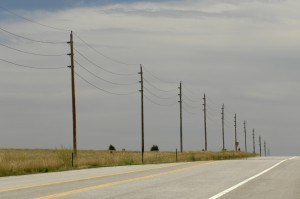
The Great Plans Communications Company has taken to notifying their customers about the growing problem of rural phone calls that never go through.
Rural Americans in 37 states are experiencing unprecedented problems making and receiving telephone calls on their landline phones. The problem has grown so much, the Federal Communications Commission has announced it will investigate the 2,000 percent increase in complaints from customers who are fed up with bad phone service.
In a Stop the Cap! special report published this week, we shared details about the deteriorating landline networks owned by AT&T and Verizon. But the problem extends beyond those phone companies, and is causing more than a little inconvenience for affected customers.
Hospitals report they are increasingly unable to reach rural patients and 911 emergency call centers say a growing number of emergency calls are not getting through. Callers assume the problem isn’t with their landline telephone company, but with the hospital or 911 call center.
In response, the FCC has created the Rural Call Completion Task Force to investigate delayed, uncompleted, or poor quality calls.
“It’s not only an economic issue, it’s a public safety issue,” said Jill Canfield, the director of legal and industry at the National Telecommunications Cooperative Association.
In parts of Minnesota, problems are not limited to local dial tone service, but also extends to long distance calling.
Members of the Minnesota Telecom Alliance, which represents rural phone companies in Minnesota, discovered growing problems completing calls nearly a year ago. Customers would dial numbers and be met with silence or uncompleted call intercept recordings. Other customers, especially in area codes 320 and 218 couldn’t hear or be heard by the other calling party. Other calls sounded like they were made underwater.
Phone companies also dealing with frustrating long distance problems have taken to their blogs to alert customers. Great Plains Communications is one example:
For a while now, we’ve been aware of a particularly frustrating situation affecting rural telephone customers around the country.
Across the country, residents of rural communities are unable to receive long distance phone calls or are receiving calls of poor quality due to incomplete or blocked long distance calls. The issue affects landline, toll-free and wireless long distance calls.
So what’s the reason for this? Well, in the U.S., phone calls are carried on a network of phone lines that may be owned by a wide range of companies who charge a fee to carry long distance calls. To cut costs, some long distance companies attempt to use the lowest cost route available even if that route includes providers who aren’t capable of providing good call quality or even completing the call.
The result is thousands of dropped calls or calls with almost no sound quality occurring across the nation. Additional problems that customers have experienced are:
• The caller hears ringing but the receiving party hears nothing.
• The caller’s phone rings, but then hears only “dead air” when the call is answered.
• The call takes an unusually long time to place.
• Garbled, one-way, or otherwise poor call quality on completed calls.
• Callers receive odd or irrelevant recorded messages.
 Investigators examining the problem confirm that company’s suspicions that fierce cost-cutting has a lot to do with the problem, especially as phone companies try and save money using cheaper Voice Over IP technology. While most of the problems seem to afflict long distance calls (and the carriers that handle them), local phone companies like Windstream are also being targeted in the review.
Investigators examining the problem confirm that company’s suspicions that fierce cost-cutting has a lot to do with the problem, especially as phone companies try and save money using cheaper Voice Over IP technology. While most of the problems seem to afflict long distance calls (and the carriers that handle them), local phone companies like Windstream are also being targeted in the review.
A decade ago, consumers chose their long distance provider. But today’s bundled service packages often include unlimited long distance, using the phone company’s preferred provider. Some long distance calls are routed over the least expensive route, even if call quality suffers.
What particularly provokes customers are quality reductions coming at the same time companies like Windstream are raising prices in states like Minnesota.
Windstream defends its network and says it isn’t to blame for the problems.
“The fault is not in our network and not in our system,” Windstream spokesman Scott Morris told the SCTimes. “We do feel like we’re providing high-quality service … in what we can control and fix.”


 Subscribe
Subscribe